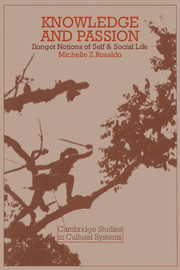Book contents
- Frontmatter
- Contents
- Preface
- Acknowledgments
- 1 The Ilongots
- 2 Knowledge, passion, and the heart
- 3 Knowledge, identity, and order in an egalitarian world
- 4 Horticulture, hunting, and the ‘height’ of men's hearts
- 5 Headhunting: a tale of ‘fathers,’ ‘brothers,’ and ‘sons’
- 6 Negotiating anger: oratory and the knowledge of adults
- 7 Conclusion: Self and social life
- Appendix 1 Ilongot phonology
- Appendix 2 Glossary
- Notes
- Bibliography
- Index
6 - Negotiating anger: oratory and the knowledge of adults
Published online by Cambridge University Press: 05 June 2012
- Frontmatter
- Contents
- Preface
- Acknowledgments
- 1 The Ilongots
- 2 Knowledge, passion, and the heart
- 3 Knowledge, identity, and order in an egalitarian world
- 4 Horticulture, hunting, and the ‘height’ of men's hearts
- 5 Headhunting: a tale of ‘fathers,’ ‘brothers,’ and ‘sons’
- 6 Negotiating anger: oratory and the knowledge of adults
- 7 Conclusion: Self and social life
- Appendix 1 Ilongot phonology
- Appendix 2 Glossary
- Notes
- Bibliography
- Index
Summary
Marriage and killing are seen by Ilongots both as proof of and occasion for ‘anger.’ Young men display liget in taking heads and winning the favor of the kin of the women they marry. But in proving themselves among peers, youths will move, make new ties, cause offense, and occasion reflection on ongoing social alignments. For elders, the liget called forth as a boy becomes an adult requires not only direction but also discussion. Either casually or in the formal context of an oratorical confrontation, adult men show themselves to have the bēya that permits them not so much to regulate social life as to negotiate its interpretation; speaking well, they may clarify, change, or affirm what is ‘known’ about kinship and social connection, giving explicit form to inchoate and shared understandings on which the diffuse reciprocity of daily living depends.
My purpose in this chapter is to explore this ‘knowledge’ of older men as it relates to stability and continuity and also to changes in social relationships over time. What do adults ‘know’ and how does it relate to youthful ‘anger’? What sort of bēya constitutes the frame for everyday cooperation and how does it differ from the oratorical stances adult men may adopt when shared expectations cease to be viable? Ilongots do not conceive of a “social world” or see their situation as one in which individuals must conform to, and reproduce, a differentiated and enduring social order.
- Type
- Chapter
- Information
- Knowledge and Passion , pp. 177 - 220Publisher: Cambridge University PressPrint publication year: 1980

